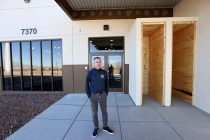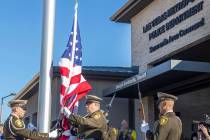Water conservation rebate reversal is head-scratcher
A water conservation program offering a rebate encouraging property owners to remove grass in favor of desert landscaping has come under attack in some quarters for permitting one property owner to renew his love affair with a lawn.
From the viewpoint of any critic, the first thought that comes to mind is we live in a desert, where water is scarce and rain often becomes a news event, so why offer the road back to water-guzzling grass for anyone?
Even more disconcerting is the fact that we have been in the midst of a severe drought for more than a decade, and during that time frame, population and the simultaneous demand for water have increased, especially in Summerlin.
In essence, the shortage of water throughout the valley remains critical, irrespective of the heavy snowfall in the northern reaches last winter.
The question, then, is simple: Why allow anyone to return to sod after they agreed to accept a generous payment from the Southern Nevada Water Authority to turn in their grass for rocks and cactuses?
The answer also is simple.
"For residents of Summerlin and most other sectors of the valley, the contract they agreed to under the Water Smart Landscapes Rebate program allows them the right to revert back to grass at any time," explained Kristen Howey, a spokeswoman for the water authority.
"When property owners agree to participate in the rebate program, in most cases, they're told that they could return to grass if they wish," Howey said.
Oddly enough, the rules on reverting to grass become somewhat murky, depending on where you live, according to Howey.
"For example, as we understand it, if you live in Henderson, you cannot revert to grass once you've torn it out," she said. "In Las Vegas and North Las Vegas, there is no prohibition, other than the possibility of homeowner association rules. But those are municipal rules. We, the SNWA, deliver the water. We don't set the rules for operating its use."
That right of reversal also is subject to certain requirements contained in the agreement, such as returning the amount of the rebate given by the authority, in addition to interest and an administrative fee.
Howey noted that throughout the valley, the water authority has entered into more than 41,000 residential contracts and more than 5,000 commercial agreements for removing grass since the rebate program was initiated in 1999.
"It would be almost impossible to determine how many of those are in Summerlin without tediously searching through the list, one-by-one," Howey added.
Suffice it to say there's a goodly number of properties in Summerlin where the rebate has served as an incentive to remove grass for desert landscaping. After all, $1.50 per square foot of grass removed and replaced with rocks and desert foliage, up to the first 5,000 square feet, is nothing to sneeze at. Beyond the first 5,000 square feet, the water authority will rebate at $1 per square foot. The maximum rebate for any property in a fiscal year is $300,000.
"I'll say this about Summerlin," said Howey. "That area has been a great supporter of the Water Conservation Coalition."
She referred to the fact that the coalition, which is made up of public and private interests, works closely with the water authority to support conservation. Tom Warden, senior vice president at The Howard Hughes Corp., is vice chairman of the coalition.
So what's the fuss, you might ask? Why throw the water authority under the bus for reversing only one of the more than 46,000 Water Smart Landscapes Rebate contracts in 12 years?
At a recent meeting of the water authority board, the request for the one reversal was made and the board approved it, in accordance with terms of the agreement.
"The question of reversal had never come up before because no one ever requested it," said Howey. "At that meeting, the board simply clarified the requirements for reversal. It solidified the process, which has always been available to anyone."
Howey added that the resulting notoriety has generated a rash of new applicants for the rebate.
As an aside, 8.7 billion gallons of water are being saved annually as a result of the rebate program.
Herb Jaffe was an op-ed columnist and investigative reporter for most of his 39 years at the Star-Ledger of Newark, N.J. His newest novel, "All For Nothing," is now available. Contact him at hjaffe@cox.net.

















